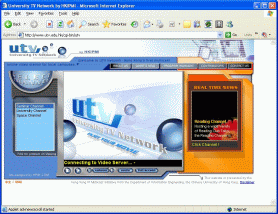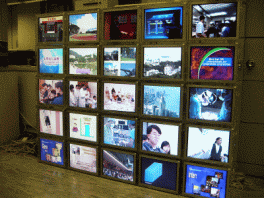 |
|||||||||
|
|
|||||||||
|
|
|||||||||
 |
||||
|
Production-Quality and Prototype Multimedia Systems |
||||
|
The following multimedia systems are developed at MCL. These softwares and their underlying technologies are available for licensing. Please feel free to contact us for more information. 1. LiveCast - A System for Multicasting Streaming Video over IP Networks This software system is developed as part of the Hong Kong IP Multicast Initiative. Specifically, LiveCast is a multicast-based video streaming application designed for online video multicasting such as TV-over-Internet, pay-TV, etc. The LiveCast system is a complete solution comprising a LiveCast Streaming Server, a LiveCast Streaming Client, a Security Server, a Key Distribution Server, and a Video Program Scheduler. The LiveCast Streaming Server supports streaming of prerecorded and precompressed video contents as well as real-time live contents captured through a hardware MPEG encoder. It supports encrypted video streaming as well as reliable video streaming using forward-error-control codes. Once encoded and multicast, the video streaming can then be received by a virtually unlimited number of receivers through an IP multicast-enabled network. Content security and user authetication are controlled by a full-fledged Security Server, which employs public-key cryptography for authetication and periodic content key updates for content protection.
LiveCast is a production-quality system that can be readily deployed. For commercial or educational licensing please contact us for more details. 2. SSVoD - A Super-Scalar Video-on-Demand System This is a software developed as part of the research on scalable video streaming systems. In particular SSVoD implements the super-scalar VoD architecture described in the following research paper:
SSVoD is a proof-of-concept system developed under the Linux operating system platform using C/C++. The SSVoD Server is format-independent while the SSVoD Client currenty supports MPEG1 streaming. Other formats can be added by incorporating the appropriate audio/video decoders. 3. Consonant Broadcasting System for Metro-Scale Video Streaming This is a software developed as part of the research on scalable video streaming systems. In particular Consonant Broadcasting implements the open-loop video multicasting algorithm described in the following research paper:
Consonant Broadcasting is a proof-of-concept system developed under the Linux operating system platform using C/C++. The Server is format-independent while the Client currenty supports MPEG1 streaming. Other formats can be added by incorporating the appropriate audio/video decoders. 4. SLVoD - A Server-less Video-on-Demand System This is a software developed as part of the research on decentralized video streaming systems. SLVoD implements the server-less VoD architecture under the Microsoft Windows platform. It consists of two components: a SLVoD Service running as a system service under Windows to manage the host's storage and to serve incoming requests for video data blocks; a SLVoD Client application that the user can invoke to start a video streaming session. There is also a separate software tool to pre-process and distribue the video data to the decentralized hosts.
|
||||
|
Contact Webmaster with comments or questions regarding this site. |
||||
 In addition the system also includes a Video
Program Scheduler to create, monitor, manage, and schedule video programs for multicasting over a large number of channels. These are integrated with the Security Server to enable
provisioing of per-user access control, per-user-group access control, usage statistics collection, and so on. An example can be found at the
In addition the system also includes a Video
Program Scheduler to create, monitor, manage, and schedule video programs for multicasting over a large number of channels. These are integrated with the Security Server to enable
provisioing of per-user access control, per-user-group access control, usage statistics collection, and so on. An example can be found at the  The current implementation also supports fault
tolerant through the use of Reed-Solomon Erasure Correction codes. The system can survive failures of individual hosts (up to a prederetmined maximum) and maintain continuous video
streaming and plaback transparently without requiring any reconfiguration or user interaction. The photo shows the SLVoD system prorotype at MCL.
The current implementation also supports fault
tolerant through the use of Reed-Solomon Erasure Correction codes. The system can survive failures of individual hosts (up to a prederetmined maximum) and maintain continuous video
streaming and plaback transparently without requiring any reconfiguration or user interaction. The photo shows the SLVoD system prorotype at MCL.